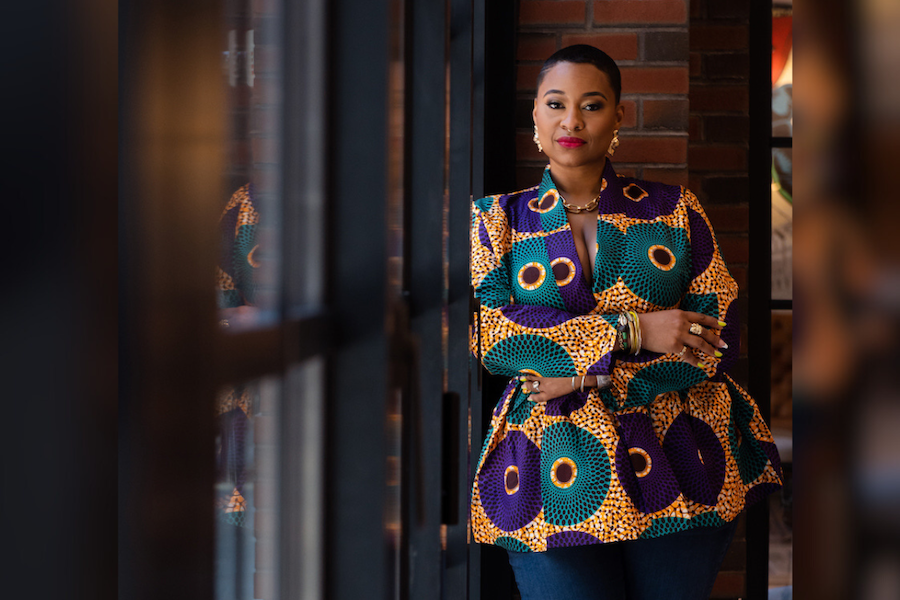Trinice McNally grew up listening to her grandmother tell stories about Black people surviving and rebelling against oppressive systems. As a British-Jamaican who spent the majority of her life in America, reconnecting with her Ghanaian, Nigerian, Burkinabé and Bissau-Guinean ancestry was important to her. Learning about Black women’s struggles especially sparked her interest in feminism and spirituality.
With 13 years of experience working at historically Black colleges and universities, McNally is the founding director of the Center for Diversity, Inclusion and Multicultural Affairs at the University of the District of Columbia. She says working with people with disabilities, Black, Brown, feminist, LGBTQ2S+ and immigrant students was the catalyst to embracing Ifa – religious and spiritual practices from the Nigeria Yoruba tribe.
“Researching and being a part of Black feminist causes led me to the Orishas,” McNally says. Orishas are gods, goddesses and spirits the Yoruba and other traditional religious African diasporans worship.
McNally began exploring African Traditional Religion (ATR) in 2018 and was initiated into Orisha in 2020. Her duties as a priestess involve divination, counselling, spiritual guidance, performing rites and running a temple where she trains new Orisha initiates.
As a practicing priestess, McNally credits Oshun, the river goddess of Yoruba people, as her polestar for Black feminism. She focuses on the experiences of Black women who are fighting racism and classism alongside patriarchy. “Oshun fought for oppressed people, women, and children. Her actions, both past and present, are political. She’s for the underdog. Her principles are feminist,” she says.
According to Yoruba cosmology, when Oshun discovered the people of Osogbo were in turmoil from enemy attacks, she helped them win their battles. Also known as Osun, she is still worshipped at the Osun-Osogbo Sacred Grove, a UNESCO World Heritage Site in Osun State, Nigeria.
While the goddess has been integral to African diasporic religions for centuries, Juju Bae was introduced to her through Beyonce’s 2016 album, Lemonade. Conversations about the ATR symbolism in Beyonce’s yellow dress and water baptism in her Hold Up music video were enough to spike Bae’s curiosity about her ancestors. Describing herself as a Beyonce practitioner, Bae launched A Little Juju podcast in 2018 to help Black people navigate contemporary culture while learning about ATR.
Often synonymous with voodoo dolls, juju is regarded as a practice that can control anything and is considered demonic by several religions – especially the Abrahamic faiths. Attributing this to colonialism, Bae aims to destigmatize it. She says Black people are forced to think their ancestral traditions and religions are evil – and women receive the brunt of it.
More on Broadview:
- Black immigrants find belonging and community in faith spaces
- Mahsa Amini protests are part of a long history of Iranian women’s resistance
- More young girls are fearing for their safety as they engage in activism
“For centuries, women’s autonomy was destroyed when they were called witches. I’m dispelling that with my name,” says Bae. “Juju Bae denotes a traditional spiritual baddie who is youthful, carefree, approachable and a serious practitioner. ATR honours and elevates women to a level I wasn’t used to, having had a background that was heavily influenced by Christianity.”
Chief Ìyánifá Ifáṣèyí Bámigbálà Ọlátúnjí-Arẹ̀sà, a Yorùbá Ifá-Òrìṣà priest, says ATR is about embracing identity and respecting diversity. According to her, Ifa doesn’t discriminate against any culture or religion.
Ọlátúnjí-Arẹ̀sà’s experience of Christianity was bittersweet because she spent her childhood in Southern Baptist churches and was scrutinized for her complexion and hair texture. But that didn’t stop her from embracing its values, even as a traditional priestess.
“God is diverse. Nobody is outside the coverage of Olodumare [Almighty God]. An Ifa practitioner respects people who practice and who don’t,” says Ọlátúnjí-Arẹ̀sà “We respect people who have different opinions about our spiritual lifestyle, even when they say hurtful things about our religion. Iwapele in Ifa is about dignity and grace in everything.”
According to McNally, Iwapele is a concept of Ifa that emphasizes gentle character and benevolence to nature and the earth. It’s about balance and paying proper homage to everything in the environment. McNally says it also influences how Ifa practitioners greet themselves.
“Orunmila, another name for the deity of wisdom, ensures that whenever you come to the house of a Babanifa or Iyanifa [mothers of wisdom], you must always greet ‘Aboru, Aboiye, Abosise’ before we respond because we must pay homage to the three women who saved his life,” she explains. “There’s nothing that you can do without women in Isese.”
Isese is the process of passing wisdom from ancestors. McNally says Orunmila initiated his daughter as an Iyanifa, because an initiation to Ifa cannot happen without Iyanifa. “We guide, we nurture, we protect and we’re respected equally for our contributions,” says McNally. “That in itself is feminism.”
Correction: In a previous version of this story, Broadview incorrectly reported that Chief Ọlátúnjí-Arẹ̀sà spent her childhood in Pentecostal churches. The error has been corrected in this version.
***
Gabriella Opara is a Lagos-based freelance culture journalist with bylines in Okay Africa, Mail & Guardian, Zikoko, Fulcrum Magazine, BellaNaija and others.
















Acts 17 22-34 We are all one in blood, we are all God’s offspring.